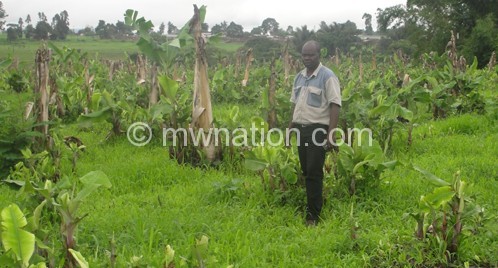Govt blamed on banana dangerous disease

The Civil Society Agriculture Network (Cisanet) has blamed Malawi government on its inaction against banana bunchy top disease which is currently threatening productivity of bananas in the country.
In a press release issued on Friday, signed by Cisanet board chairperson Willie Kalumula and national director Tamani Nkhono-Mvula, the network said the disease is threatening to wipe all the banana plants in the country and thereby affecting the livelihood of farmers who are dependent on the crop.
“Cisanet has observed that although warnings of the disease have been raised by experts to Government and also control measures proposed, bold decisions and actions to implement these recommendations have not been taken. However, taking a bold step now may save some of the remaining unaffected crop.
“The disease is much spread today because action was not taken when the disease was first discovered,” reads the statement.
The agriculture network recommends that the movement of banana suckers although restricted must be policed by stakeholders and that the movement of suckers is assumed to be one of the major weaknesses that has led to the wide spread of the disease in the country.
Cisanet further recommends that stakeholders must raise awareness on the disease and notes that some farmers have not complied with the destruction of infected banana plants as it is regarded as a threat to their livelihood.
The statement notes that government funding for the banana programme has not been forthcoming.
However, Ministry of Agriculture and Food Security spokesperson Sarah Tione in an interview on Sunday said government is encouraging farmers to uproot and burn infected banana crops.
“Some farmers are reluctant to uproot and burn the infected because of the labour implications. We have new cultivars that we are encouraging them to replant but we can not force them to do that because the farmers are knowledgeable and have some indigenous knowledge from which we can learn,” she said.
Earlier in January Bvumbwe agriculture Research Station chief pathologist Misheck Soko who has done extensive research on the disease was quoted in the Weekend Nation warning that unless government intervenes quickl,y the banana population would be extinct in one year.
Soko noted that the disease is the most dangerous for bananas in the world and there is no known cure. He further noted that about 60 percent of the country’s bananas has been destroyed and the remaining 40 percent is infected.
The Food Agriculture Organisation (FAO) estimated that in 2009 Malawi produced 400 000 tonnes of bananas earning about $95 million (K32 billion).
Production of bananas in the country is mostly done by smallholder farmers with Mulanje, Thyolo, Nkhata Bay and Karonga as traditional growing districts. In these districts bananas form a major part of the diet. However, the crop is also grown in all the other districts but planted unsystematically in clusters or along garden boundaries and around homesteads.





